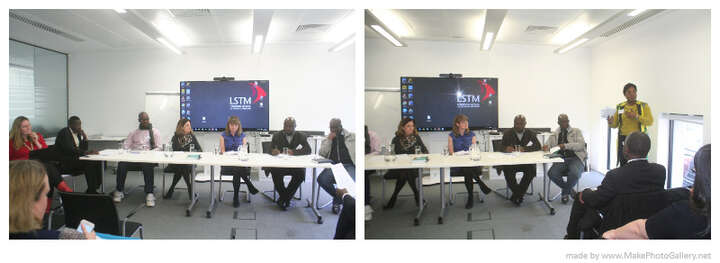
By Professor Sally Theobald, Professor Margaret Gyapong and Dr Theresa Hoke
COUNTDOWN recently held its Annual Partners Meeting from 19th – 21st March 2018. Partners who make up the research consortium came from Cameroon, Ghana, Liberia, Nigeria, the UK and the USA congregated at the Liverpool School Of Tropical Medicine. As part of this meeting, a lively panel on stakeholder engagement and policy influence was led by the Ghana Social Science lead – Prof Margaret Gyapong. Panellists included programme managers (Dr Benjamin Marfo, Neglected Tropical Diseases [NTDs] Programme Manager from GHS, Ghana); social scientists (Kim Ozano from LSTM); health economists (Fred Sosu from UL-PIRE in Liberia); parasitologists (Dr Mike Osei-Atweneboana from the Council for Scientific and Industrial Research in Ghana), Prof Samuel Wanji from the University of Buea in Cameroon and Theresa Hoke from FHI 360 in the USA.
Here's what we learned:
(1) To build inclusive partnerships and sustain action, stakeholder engagement means going beyond the usual suspects, for example:
a) When developing alliances with the health sector, we need to work at all levels and think about opportunities to maximise leverage. Dr Benjamin Marfo has been developing links with the Ghanaian parliamentary sub-committee on health to enhance political commitment to NTDs. He has also worked with training institutions and alliances of doctors and health care workers to make sure Female Genital Schistosomiasis is put on and stays on the agenda.
b) Given NTDs are shaped by the social determinants of health, there is a need to build multi-sectoral partnerships. In Liberia, the NTD Ambassador Dr Evelyn Kandakai used to be the Minister of Education and is well placed to support these linkages. Work from COUNTDOWN Nigeria also shows how links with education are important and that these need to be fostered at all levels including with parent-teacher associations who are critical partners for smooth delivery of MDA within schools.
c) The use of participatory methods is powerful. For example, use of transect walks – which include a walk through a community to better understand how information is shared and networks happen--has brought about new ideas for community engagement in rural Nigeria. One novel example was working with motorbike drivers. In all communities; community drug distributors (CDDs), chiefs, religious leaders have been part and parcel of agenda-setting and the research process.
d) Media partnerships remain critical. Supporting ‘embedding’ of journalists in the realities of the NTD programmes as exemplified in training organised by partners in Cameroon – and the experiences and challenges of CDDs and affected communities--has produced an engaged and passionate group of journalists who can “make noise”.
Partnership and active engagement across the research cycle (and not classic passive dissemination at the end of a process) support ownership and relevance of research. Trust and relationships are essential for heightening the likelihood that research evidence gets applied. So is being creative, developing and sharing a range of research products (think beyond the academic paper here!)
(2) To be impactful, implementation research should:
a) Respond to obstacles NTD programmes are facing: Why are people not taking drugs? Why do hot spots still exist and what are the best strategies to address these? How can we best develop and implement alternative strategies?
b) Dialogue with NTD programmes and other stakeholders—including some unconventional partners --on key emerging issues from research and how best to address them. For example, the gender of the CDDs can shape the extent to which they can access/not access individuals within households in Nigeria; men are more likely to be missed in MDA campaigns in rural Ghana and are also less likely to adhere to drug regimens
c) Have impact, and the panel identified different examples here:
i) Research findings from the COUNTDOWN situational analysis were used to inform the development of Liberia’s first ever-NTD health promotion strategy.
ii) The participatory action research process in Nigeria has built the capacity of the Federal ministry of health and will directly feed into and shape the next round of MDA so that it better responds to community and front-line health worker realities and constraints.
iii) Successful research testing interventions that bridge programs that don’t normally work together has laid groundwork for co-implementation of programmes for example joint planning and distribution of bed nets between the NTD and malaria programmes in Ghana.
When asked if there was a chance that the research results from COUNTDOWN will be taken up and used, the answer was a resounding yes! Thoughtful, active engagement with stakeholders will help to stimulate an appetite for evidence-based innovations and will strengthen trusting partnerships for research impact.
